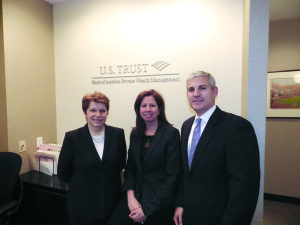U.S. Trust hones ‘better, simpler’ financial life
U.S. Trust dates to the 19th century, but a recent visit to the company”™s Stamford office ”” one of three in Fairfield County ”” highlights a thoroughly modern approach to private wealth management. For starters, they gang up on a client: four on one, at least; sometimes they”™ll bring in associates.
And that”™s not only fair, it”™s desired. For each client”™s “core-four” advisers, “communication is key,” according to a roomful of U.S. Trust executives who recently addressed a broad range of company issues with the Business Journal. The company since 2007 has been the private wealth management arm of Bank of America.
Clients span fresh-minted entrepreneurial successes to established business owners. Some have achieved ultra-high net worth status, for which the term “If you have to ask ”¦” was invented. A company seminar titled “Raising Philanthropic Kids” might target a family foundation.

After three months as managing director for U.S. Trust”™s Fairfield County, Westchester County, N.Y., and Long Island region, Robert P. Pizzella pointed to what he termed “socially responsible and innovative investing” as an example of company ethos meeting client ethos.
“We match investing with client values,” he said. “Early on, this probably meant no alcohol and tobacco. Now, it”™s a positive selection process. A person might be interested to know how many women and minorities serve on a particular board.” Social and religious preferences can cut both ways ”” give to A, but never to B ”” and also can be part of the equation.
“Our focus is making the financial lives of our clients better and simpler,” Pizzella said. “With the core, we”™re able to deliver the broader U.S. Trust enterprise at every level.”
Adapting to a generational shift, “Elder Care” is now a bona fide and named service. Those navigating elder waters will recognize what U.S. Trust, too, has recognized: situations require help and those who assist probably need help themselves. The firm is a clearing house for client assistance.
Financial analysis includes input from a strategy team based in New York City that is removed from the daily profit fray, a point stressed by Andrew F. McGrade, managing director and market investment director.
“They have nothing to sell,” McGrade said of the analysts. “They”™re not driven by sales or an agenda. They write prolifically and provide us with tremendous intellectual capital.”
McGrade called U.S. Trust “a large firm with unusual skills.” Experts with U.S. Trust include advisers in farming, timber, oil and gas, and even the paintings on the wall ”” all of which equate to a vast economy that nearly equals all traded equities. The larger the portfolio ”” notably the ultra-high-net-worth client ”” the more likely he or she would be interested in these more unusual diversifications. Not knowing about them “would be like playing with one hand tied behind our clients”™ backs,” McGrade said. Two-hundred eighty U.S. Trust employees focus on these investment markets. “No one else talks about this.”
The firm”™s national total is more than 4,000 employees in 140 offices in 32 states. Their toolkits include “cross-over fixed income” program, where, reduced to its basic level, the left hand of a portfolio coordinates with the right. In “global opportunistic equity portfolio”-speak, an opportunistic manager, in the words of Pizzella, “has a larger sandbox to play in, seeking the best opportunities regardless of where they are.”
The tailoring of services and the umbrella-like coverage of interests by a “core” team of four are constants of a one-hour sitdown with U.S. Trust”™s Managing Director-Regional Executive Margaret M.V. Preston; Pizzella; McGrade; and Managing Director-Wealth Strategist Mary Wall.
Wall said a common industry problem is a lack of communication between adviser and client. “We find when they come to us that what they want and what they have in place often are not in sync,” she said.
Life changes like retirement and large business transactions might bring clients, no two of whom are exactly alike. “I want to hear from the client,” Wall said. “A lot of advisers want to come in with solutions. I want to know what”™s practical. Does it make sense for a family?” She will ask about children and charities, but she also hones in on what she called “worst-case scenarios.”
“Contingency plans are a must,” Wall said.
As such, Preston noted, “Mary brings in the lawyer and the CPA and makes sure they”™re on the same page.”
Besides Stamford, U.S. Trust maintains offices in Westport and Greenwich with a total 60 employees, plus four more in-state offices.
All offices in the last five years have witnessed Family Wealth Services go from a previous teaching framework to a codified education system.
“Soup to complex, always being respectful of the client” Preston said of the services. Within the Family Wealth Services is a segment titled Elder Care in which tactical concerns like an inventory of assets merge with strategic help like family care. “We”™re very engaged outside the community,” she said, citing issues like extended care and at-home services.
Clients with elder concerns also have children and, as such, Preston called them “the sandwich generation. She said if they had a common thread for managing their assets: “Not too much risk, but a person wants to grow. I think peace of mind is one of the things we provide.”
Pizzella said a company principal is that “money has a mission.” Less broadly, “We listen very carefully about what our clients want and then we have an expert in everything that”™s important to them.
“Our team-based experience is unique because our clients are unique,” he said. Investment fundamentals, valuation and technical considerations underpin company strategies. “We deliver on the fiduciary level at the highest possible level of service.”
One upshot is that when Northeastern clients retire elsewhere or involve themselves in business elsewhere, they tend to stay with their regional U.S. Trust office for services.
Said Pizzella, “We travel.”